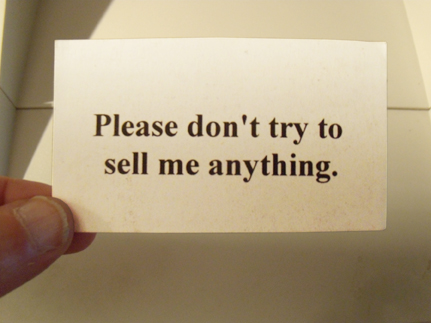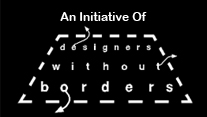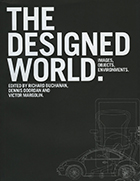Victor Margolin

In recent years the once spontaneous exchange between buyers and sellers has become increasingly mechanized. This has occurred in a number of ways. As one example, the Internet became a prime source of goods and buyers learned to follow standardized protocols to select their merchandise and pay for it. Another form of mechanization is the automated telephone system, where the customers encounter a simulated human voice, either a man or a woman (both apparently Caucasian with a region neutral accent) that attempts to walk them through a series of questions unless they know they can subvert the process by shouting “Agent” into the phone, at which point the voice calmly responds that the supposed man or woman behind it understands that the customer wants to speak to a live person and forwards him or her to one. Finally, real human beings are being robotized by being forced to enact scripts in dealing with customers, scripts that involve trying to sell them something they didn’t ask for. This has happened to me on a number of occasions.
Several years ago the checkers in my local supermarket started asking me, after they totaled up my purchases, if I wanted to buy an additional product, that was on sale. I found that I disliked the process because I felt I was being treated as a mark who might shell out additional cash if presented with a bargain, usually something I would never buy such as some kind of junk food. I experienced the impulse to get angry each time I bought groceries but, finding this disagreeable, I began to think of ways to communicate my displeasure at being offered a product I didn’t want without becoming apoplectic. Finally I hit on a solution. I had some small cards printed up with the statement, “Please don’t try to sell me anything,” on them. I began to hand them out whenever a store clerk tried to sell me a sale item. Sometimes the clerks were flustered but more often than not, they were glad to get the card as it provided some comic relief from their onerous obligation to shill for the corporate suits sitting in a far away boardroom plotting ways to wring more cash out of their customers.
Recently, I have found that this scripted customer interaction has become more prevalent and is rapidly becoming the norm for commercial exchanges. It is the case at the Borders Bookstore I frequent. There clerks are obligated to offer customers a Borders reward card if they don’t present one and are even encouraged to gently attempt to persuade the customer to get one if he or she appears hesitant or unsure of its value. In the Seattle’s Best Coffee upstairs in the Borders where I go frequently, a young clerk asked me one evening if there was anything else I wanted after I had ordered my double espresso. I told him that if I had wanted anything else I would have asked for it. He seemed surprised that I was annoyed. I told him frankly that I did not like a hard sell when I was simply trying to purchase a cup of coffee. He got mildly huffy and said, “Well if I don’t ask you if you want anything else, I’ll lose my job.”
Finally, I was purchasing some theater tickets through Ticketmaster and went through the purchase info with the clerk who was located in a call center quite far from the Chicago theater where I was going for the performance. After she took my vital credit card info, she then asked me if I wanted to pay two dollars extra per ticket to print out the tickets on my computer rather than pick them up at the box office. After I declined, she subsequently offered to sell me ticket insurance, something I had never heard of before. Ticket insurance, I learned, was to insure that you were reimbursed in case you were unable to get to the theater for some legitimate reason such as illness, a malfunctioning vehicle, or a late airplane arrival. I had never heard of such a product whose cost was 25% of the ticket price and I forcefully rejected it. This was further evidence that going about your business as a customer increasingly sets you up as a mark who might buy yet something more.
Whereas such products are presented on the internet through pop up ads and other carnivalesque devices, it now appears that the suits have figured out that live salespeople can be trained to promote goods as aggressively as Google does on the Internet. It seems that merchandising is being turned into a giant machine that robotizes clerks and forces them to dish out a hard sell for something additional every time a customer buys a cup of coffee or a tube or toothpaste? It’s all part of the selling society where everyone seemingly is promoting a product or themselves. How many times have I given someone I met at a conference or social event my card only to find that I ended up on their personal mailing list for announcements of their new books, their exhibitions, or even the recent births in their family. If participation in commercial exchanges as a customer or even a seller is one of the ways that in the process of socialization, then it appears that we are increasingly becoming socialized to put the sale of something or other at the forefront of our social exchanges. This is more bearable when it can be called to the attention of a friend or acquaintance as a mannerism to be avoided but intolerable when it becomes part of forced to interact with customers according to scripts that characterize the customer as a mark who might be induced to lay out more cash for something or other rather than a fellow human being who just happens to be on the buying end of a commercial transaction.
According to the late marketing guru, Philip Kotler, treating the customer as a mark is the lowest form of salesmanship, while considering him or her the equivalent of a family member is the highest. As a consequence of the economic downturn, merchandising has been spiraling steadily downward as corporate suits become more desperate to rack up profits for their shareholders. Their desperation is then turned on the customer whom executives believe may be induced to shell out hard earned cash for such fantastical non-products as ticket insurance offered by live human beings whom they have turned into robotized selling machines. In desperation, I might even print up tee shirts with the slogan “Please don’t try to sell me anything” emblazoned on the front. When a clerk next tries to sell me six stale candy bars or an insurance policy that will compensate me in case I drop my grocery bag on the way home, I can respond by offering one of my tee shirts in exchange. After all, the worst place to be in a selling society is to be stuck with nothing to sell.
Victor Margolin, Professor Emeritus of Design History in the Department of Art History of the University of Illinois at Chicago and a founding editor of DesignIssues, is a regular contributor to Design-Altruism-Project.











October 13, 2010 at 5:40 pm
If tee shirts where printed with this slogan on them, I would happily purchase one in every color. This would definitely be the answer to all my prayers. It wasn’t until just a few weeks ago that I realized how “the selling society” has become completely ridiculous. When applying online for a job, and the assessment test very so casually states, “All of our employees are required to solicit credit. If asked would you be willing to ask a customer?” this is when we should realize, this is a problem. But hey, I guess it is always better to know the requirements of a company upfront.
Its funny because I have always found myself to become quite irritated when I have to just make a quick run to my local pharmacy or supermarket, because I already know what to expect. What makes a clerk believe that I want to purchase M&Ms or Winterfresh Gum that is on sale, when I really just want to refill a prescription and go back home. What makes a clerk believe that I want to sign up for some promotion or store credit card, after I have just walked passed the individuals standing outside the entrance asking me to buy five dollar candy bars for a school function. Why is it that I can not buy one pair of shoes from a store without them asking me for my email address so that they can send me tons of annoying emails, just so that I will come back to their store and have them ask for my email address once again.
As much as I am completely against being rude to employees, sometimes enough is enough. So before I very rudely ignore or snap at the next clerk that tries to take even more money out of my pocket, I would much rather hand them this card or sport this tee shirt.
October 13, 2010 at 5:39 pm
I agree that we absolutely live in a selling society. Everywhere you turn, someone is trying to sell you something. People even act as walking advertisements for different brands, especially when it comes to clothing. I found the author’s idea of making cards that say, “Please don’t try to sell me anything” amusing. If I were to receive a card like this from a customer, it would add some humor to my day, and I would tell my friends and co-workers about the incident. I also found humor in his idea of making tee shirts that read the same message, and trying to sell each salesperson a shirt in exchange for their sales pitch.
I have worked in retail so I know how much pressure is put on employees to sell sell sell, and I know how annoying it can be for customers. I also know this from my experience as a customer. At the same time, every once in a while I might be offered a product that does actually interest me, that I may not have known about if it wasn’t for the sales person. Living in a selling society is not all bad. I have conflicting opinions about this selling society. I am a marketing major, so many of my classes talk about selling and obviously finding ways to appeal to the market. One idea that I agree on is that companies should throw out the scripts. Customers do not want to hear you say the exact thing you said to the three people that were in line in front of them. If a sale is the goal, employees need to make each customer experience unique and sincere (or at least try to make it feel that way, because let’s face it…many employees are just doing their job). As customers, we must also keep in mind that the employee is doing their job and we cannot necessarily take out our frustrations on them. Why not just use our manners and simply say “no thank you”? It really is not that difficult and it only takes a second. There might be the occasional sales offer that actually interests us. What if no additional products or services were ever offered to us? We would probably complain about this just as much.
Rather than getting mad at the employee behind the counter or on the sales floor, if there is someone to blame it is definitely the employees at the corporate level. Their method of selling may be all wrong. People are not dumb and we do not appreciate things like such generic sales pitches, or never being able to speak to an actual person when we have a question. Maybe if more businesses adopted new ways of selling and interacting with customers, and created better customer experiences, we might appreciate this selling society more.